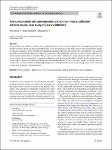Item Infomation
Full metadata record
| DC Field | Value | Language |
|---|---|---|
| dc.contributor.author | Sousa, Vitor | - |
| dc.contributor.author | Drumond, André | - |
| dc.contributor.author | Meireles, Inês | - |
| dc.date.accessioned | 2023-08-04T09:08:36Z | - |
| dc.date.available | 2023-08-04T09:08:36Z | - |
| dc.date.issued | 2023 | - |
| dc.identifier.uri | https://link.springer.com/article/10.1007/s11356-023-29045-z | - |
| dc.identifier.uri | https://dlib.phenikaa-uni.edu.vn/handle/PNK/8695 | - |
| dc.description | CC-BY | vi |
| dc.description.abstract | In the design waste collection systems, it is common practice to use a constant specific fuel consumption (e.g. litres per amount of waste collected or distance travelled). This is also the approach used in many cases for fleet management, namely, for decision-making on more fuel-efficient equipment acquisition. However, the specific fuel consumption is not constant and there are spatial and temporal variations. Accounting for this variability becomes relevant if a more refined cost or environmental optimization is intended. The present research effort evaluates the energy intensity of the waste collection service in the Cascais municipality, reporting the differences and the magnitude of the variability for the mixed waste collection service. Statistically significant differences are found between the circuits, the trucks, months of the year and days of the week. | vi |
| dc.language.iso | en | vi |
| dc.publisher | Springer | vi |
| dc.subject | waste collection systems | vi |
| dc.subject | Fuel consumption rate | vi |
| dc.title | Fuel consumption rate and emissions variability in waste collection services routes: case study of Cascais Ambiente | vi |
| dc.type | Book | vi |
| Appears in Collections | ||
| OER - Khoa học môi trường | ||
Files in This Item:

